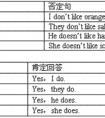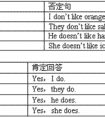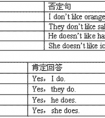请完成下列句型转换。1. I will go to Hong Kong by plane tomorrow afternoon. (对画线部分提问)____________________________________________________________________-六年级英语
题文
| 请完成下列句型转换。 |
|
1. I will go to Hong Kong by plane tomorrow afternoon. (对画线部分提问) |
答案
| 1. How will you go to Hong Kong tomorrow afternoon? 2. When is Mary going to leave here? 3. What will he do with his friends next Sunday? 4. Are they going to spend their holiday in England? 5. Tom isn't going to buy a birthday card for his mother. |
据专家权威分析,试题“请完成下列句型转换。1. I will go to Hong Kong by plane tomo..”主要考查你对 疑问副词,疑问代词,否定句,一般疑问句 等考点的理解。关于这些考点的“档案”如下:
疑问副词疑问代词否定句一般疑问句
考点名称:疑问副词
- 疑问副词:
用来引导特殊疑问句,表示时间,地点,方式,原因等,常见的有:when,where,how,why等。
分类:
时间副词:now, then, yesterday, always, already, soon
地点副词:here, home, upstairs, nowhere, above, near, beyond
方式副词:多数是形容词加上ly构成的,和一些well, fast, quick, slow, hard, alone, straight, wide
在加词尾ly时要注意:
(1)辅音+le:simple→simply, gentle→gently,
(2)以ic结尾的词:classic→classical但是public→publicly
(3)以辅音读音是[i]的y结尾的词:easy→easily
(4)特例:full→fully, whole→wholly, true→truly
程度副词,连接副词,关系副词
much, enough, quite, hardly, almost, deeply
疑问副词连接副词,关系副词:
how,who,where - 疑问副词在句中的位置及用法举例:
由于疑问副词后接疑问句,因此这些副词一般都位于句首。例如:
How do you go to school? 你怎么去上学?
Why do you dislike the game? 为什么你不喜欢这个游戏? - 疑问代词和疑问副词区别:
1. 疑问代词做对陈述句的主语,宾语或定语提问,即做句子的主语,宾语或定语, 如:
what, who/ whom, whose.
eg. Who is talking ?
What can you see?
Whose shirt is this?
2.疑问副词对时间,地点,方式等状语提问,如:
when, where, how 等.
eg. When is your birthday?
Where are you going?
How do you know?
考点名称:疑问代词
- 疑问代词:
在句子中用来构成特殊疑问句,主要用于询问“何人”、“何事”、“什么”。
常见的疑问代词如下表所示:
疑问代词
替代范围
who
人
whom
人
whose
人
which
人、事、物
what
事、物
考点名称:否定句
- 否定句:
表示否定的句子。必须有否定词。
否定句的构成形式:
a. 谓语为be动词时,“be+not "一名学生。
b. 谓语为实义动词而且没有情态动词和助动词时,“do/ does/ did+not"构成否定。
例:I do not like dancing. 我不喜欢跳舞。
He does not want to go to school. 他不想去上学。
c. 谓语为“情态动词+实义动词”时,“情态动词+not”构成否定。
例:You must not smoke. 你千万不要吸烟。
I can not catch it. 我抓不住它。 - 否定句在英语语法中可以分为九类:
(1)一般否定句
I don't know this. No news is good news.
There is no person(smoking)/not a person/not any person(smoking)in the house.
(2)特指否定
He went to his office, not to see him.
I am sorry for not coming on time.
I don't think/believe/suppose/feel/imagine you are right.
(3)部分否定
All the answers are not right
All is not gold that glitters
I don't know all of them.
I can't see everybody/everything.
Both of them are not right.
(4)全体否定
None of my friends smoke.
I can see nothing/nobody.
Neither of them is right.
Nothing can be so simple as this.
(5)延续否定
You didn't see him, neither/nor did I.
You don't know, I don't know either.
He doesn't know English, let alone/to say nothing of/not to speak of(更不用说)French.
(6)半否定句
We seldom/hardly/scarcely/barely hear such fine singing.
I know little English. I saw few people.
(7)双重否定
You can't make something out of nothing.
What's done cannot be undone.
There is no sweet without sweat.
No gain without pains.
I can't help /keep/ laughing whenever I hear it.
No man is so old but(that)he can learn.
(8)排除否定
Everyone is ready except you.
He did nothing but play.
But for your help, I couldn't do it.
(9)加强否定
I won't do it at all.
I can't see it any more.
He is no longer a boy. 否定转移的形式与用法:
一、动词的否定转移
1.形式上否定主句的谓语,实际上是否定从句的谓语
当动词“think”、“believe”、“suppose”、“imagine”、“expect”、“feel”的主语是第一人称,谓语动词为没有任何副词修饰的一般现在时,它们的否定式实际上是对宾语从句的否定。
表示说话者提出一种委婉的看法或主张。如:
I think that he will help us.——I don’t think that he will help us. 我认为它不会帮助我们。
I believe that he is right.——I don’t believe that he is right. 我认为他不对。
I suppose that he likes it.——I don’t suppose that he likes it. 我想他不喜欢它。
- 最新内容
- 相关内容
- 网友推荐
- 图文推荐
| [家长教育] 孩子为什么会和父母感情疏离? (2019-07-14) |
| [教师分享] 给远方姐姐的一封信 (2018-11-07) |
| [教师分享] 伸缩门 (2018-11-07) |
| [教师分享] 回家乡 (2018-11-07) |
| [教师分享] 是风味也是人间 (2018-11-07) |
| [教师分享] 一句格言的启示 (2018-11-07) |
| [教师分享] 无规矩不成方圆 (2018-11-07) |
| [教师分享] 第十届全国教育名家论坛有感(二) (2018-11-07) |
| [教师分享] 贪玩的小狗 (2018-11-07) |
| [教师分享] 未命名文章 (2018-11-07) |

![—— He'sneartheTVset (电视机).[ ]A.What'stheboydoing?B.Where'stheboy?C.Whoistheboy?-三年级英语](http://www.00-edu.com/d/file/ks/4/1/38/2019-08-19/smalla98d03e1cd1ad5f1eea83d4f5e418fe61566228470.jpg)
![_________ didyou_________?[ ]A. Where; wentB. Where; goC. What; went-六年级英语](http://www.00-edu.com/d/file/ks/4/1/38/2019-08-19/small4cca8e85fae1eda0cb114208d0da83c91566228121.jpg)



